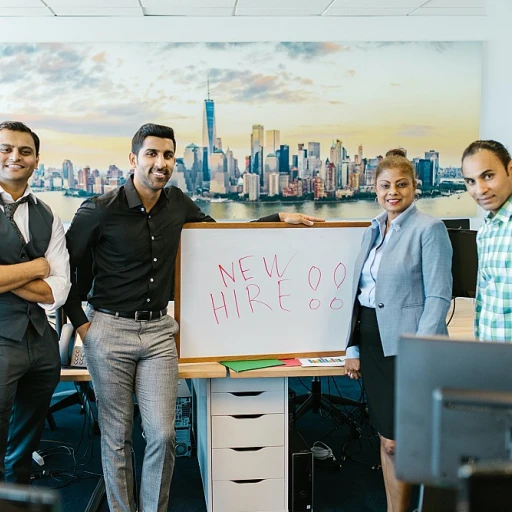
The Evolving Role of Agile Coaches
The Growing Importance of Agile Coaches
In today's rapidly changing business landscape, the role of agile coaches has expanded significantly. Originally, agile coaches focused on guiding software development teams through agile practices like Scrum. However, their responsibilities have evolved to encompass a broader influence across various departments in a company.
Agile coaches now play a critical role in helping organizations adapt to changes quickly and efficiently. By fostering a culture of continuous improvement, they enhance team productivity and collaboration. This has become increasingly important as more companies embrace remote work and need to find innovative ways to maintain team cohesion. The demand for remote full-time agile coaching jobs has surged as a result.
Many companies recognize the value agile coaches bring, resulting in numerous job openings for agile coaching positions across diverse industries, especially in the united states. Platforms like LinkedIn have seen a rise in agile-related job posts, reflecting the growing importance of this role in modern corporate culture.
The shift in the agile coach's role is not just about adopting new project management techniques but also about redefining the nature of organizational work itself. As agile practices become more integrated with company operations, agile coaches are increasingly tasked with aligning team goals with business objectives.
This expanded scope requires an array of skills and expertise, including exceptional communication abilities, strategic thinking, and a deep understanding of both team dynamics and business needs. Agile coaches must also be adept at navigating the challenges that arise as they work to implement agile practices across various teams and departments. Mastering strategic discussions has also become a crucial aspect of their toolkit.
Key Responsibilities of an Agile Coach
Core Duties and Expectations
Agile coaches today carry a wide array of responsibilities that extend beyond traditional project management roles. A primary duty of any agile coach is to facilitate the effective use of agile methodologies within a company. This involves coaching the team in practices such as Scrum and Kanban, ensuring that everyone from the product owner to the team members has a clear understanding of roles and processes.
The agile coach often works alongside team managers to remove roadblocks and foster a collaborative atmosphere. This collaboration is crucial for teams working on complex projects, often in a full-time or remote environment. Agile coaching includes conducting training sessions, workshops, and daily stand-up meetings to promote agile practices and improve efficiency in project delivery.
Enhancing Team Dynamics
For agile coaches, another key responsibility is enhancing team dynamics and communication. This may involve guiding the team through iterative phases of development to deliver a minimum viable product effectively. The agile coach plays a vital role in improving the coordination between different stakeholders, including product managers, project managers, and senior scrum masters. Ensuring a seamless flow of information and supporting the team in delivering high-quality products is central to this role.
Mastering communication within the corporate setup becomes a byproduct of efficient agile coaching, contributing to better alignment and understanding across departments.
Measuring and Adapting
An agile coach is also responsible for measuring the effectiveness of agile implementations and adapting practices to suit the unique needs of a team. This includes utilizing feedback from agile retrospectives to make incremental improvements, ensuring that the company continues to evolve and adapt to changing market demands.
Furthermore, agile coaches often liaise with HR and management as they define job descriptions and recruit for relevant job openings on platforms like LinkedIn. This includes outlining the necessary skills and qualities that align with the company's culture and operational goals, whether filling manager jobs, scrum master roles, or remote full-time positions.
Impact on Corporate Culture
Shaping the Corporate Environment: The Agile Coach Effect
Agile coaches play a pivotal role in transforming modern corporate environments. By fostering agile practices such as Scrum and iterative management, these professionals significantly impact how teams operate and communicate. The agile approach encourages collaboration and transparency, leading to improved product development and a more cohesive workplace environment. Agile coaching emphasizes the importance of flexibility. Companies often experience shifting priorities, and agile coaches help teams adapt quickly without losing focus on the end goal. This dynamic way of working not only benefits project management but also enhances overall team morale, as employees feel empowered when contributing to a successful outcome. Moreover, agile coaches influence the company's culture by promoting values like trust and open communication. By encouraging strategic conversations and providing feedback, they ensure a continuous learning loop within teams. This process nurtures a culture of constant improvement and innovation, aligning well with the current shift towards remote work models seen in numerous manager jobs and project manager roles. Additionally, agile coaches facilitate the adoption of digital tools that enhance remote full time jobs. These tools help teams maintain productivity and ensure that even geographically dispersed members can work together efficiently. As a result, agile practices become ingrained in the company culture, pushing the organization towards a more adaptive and resilient future. An insight into boosting morale in the workplace reveals the broader impact agile coaches have on shaping company culture. Agile coaching is more than just implementing frameworks; it molds the very ethos of a company by emphasizing the importance of people over processes, ensuring sustainable personal and professional growth.Challenges Faced by Agile Coaches
Addressing Challenges in Agile Coaching
In the dynamic landscape of modern corporate culture, agile coaches encounter a myriad of challenges that test their adaptability and expertise. As organizations increasingly adopt agile methodologies, the role of the agile coach has become crucial in facilitating smooth transitions and fostering effective teamwork. However, this journey is not without its hurdles. Firstly, agile coaches often grapple with resistance to change. Many established companies have deeply rooted traditional practices, and shifting these mindsets can be a delicate task. Coaches must leverage their interpersonal skills and coaching experience to guide teams and management, helping them embrace agile practices willingly. Remote work environments present another significant challenge. With the rise of remote jobs, especially those in tech-oriented fields like scrum and project management, agile coaches are required to rethink their strategies for team engagement and collaboration. Building a cohesive team dynamic in a remote setting requires innovative approaches to communication and project management. Moreover, the evolving roles of agile coaches and scrum masters can sometimes lead to ambiguity in job descriptions. Differentiating between the responsibilities of a project manager, an agile coach, and a scrum master requires clear articulation of roles and expectations. Ensuring all team members have a shared understanding of these roles is vital for cohesive operations. Finally, maintaining continuous improvement within teams calls for a thorough understanding of both agile and company objectives. Balancing short-term scrum goals with long-term strategic objectives necessitates an agile coach’s keen sense of prioritization and change management. These challenges, while formidable, offer opportunities for agile coaches to demonstrate the profound impact they can have on a company's culture, productivity, and overall success. With the right skills and a commitment to continuous learning, agile coaches can turn these challenges into pathways for professional growth and organizational excellence. Navigating these complexities not only highlights the importance of the agile coach role but also underscores the value of having skilled professionals in these positions. As the demand for these roles continues to grow, so too does the potential for agile coaches to shape the future of work in the corporate landscape.Skills and Qualities of Successful Agile Coaches
Essential Skills and Attributes for Agile Coaches
In the dynamic world of corporate culture, the role of an agile coach is pivotal. To thrive in this position, certain skills and qualities are indispensable. These professionals are not just facilitators; they are catalysts for change, guiding teams and organizations towards more effective agile practices.
Here are some key skills and attributes that successful agile coaches possess:
- Deep Understanding of Agile Methodologies: Mastery of agile frameworks like Scrum is crucial. An agile coach must be well-versed in these methodologies to guide teams effectively.
- Strong Communication Skills: Whether working with a remote team or in-person, clear and effective communication is essential. This includes the ability to listen actively and provide constructive feedback.
- Leadership and Mentoring: Agile coaches often take on a leadership role, mentoring team members and helping them grow in their roles. This requires patience and the ability to inspire others.
- Problem-Solving Abilities: Challenges are inevitable, and agile coaches must be adept at identifying issues and finding innovative solutions.
- Adaptability: The corporate landscape is ever-changing. Agile coaches need to be flexible and open to new ideas and approaches.
- Experience in Project Management: Understanding project management principles can enhance an agile coach's ability to guide teams effectively.
These skills not only help agile coaches in their day-to-day jobs but also make them valuable assets to any company looking to improve its corporate culture. As the demand for agile practices grows, so does the need for skilled coaches who can navigate the complexities of modern business environments.
Future Trends in Agile Coaching
Emerging Trends in Agile Coaching
The landscape of agile coaching is continuously evolving, influenced by shifts in corporate culture and technological advancements. As companies strive to remain competitive, agile coaches are expected to adapt and innovate. Here are some trends shaping the future of agile coaching:
- Remote and Hybrid Work Models: With the rise of remote jobs, agile coaches are increasingly required to facilitate team dynamics across dispersed locations. This shift demands a new set of skills to manage virtual teams effectively, ensuring that agile practices are maintained regardless of geographical barriers.
- Integration of AI and Technology: The use of AI tools in project management is becoming more prevalent. Agile coaches need to harness these technologies to enhance productivity and streamline processes. This includes using AI for data analysis to provide insights into team performance and project outcomes.
- Focus on Soft Skills: As the role of an agile coach extends beyond traditional boundaries, there is a growing emphasis on soft skills such as emotional intelligence, communication, and conflict resolution. These skills are crucial for fostering a positive corporate culture and enhancing team collaboration.
- Increased Demand for Specialized Roles: There is a growing demand for specialized agile roles, such as senior scrum masters and agile product managers. This trend reflects the need for expertise in specific areas of agile practices, offering more targeted coaching and guidance.
- Emphasis on Continuous Learning: Agile coaches are expected to stay updated with the latest methodologies and trends. Continuous learning and professional development are essential to maintain relevance and provide value to teams and organizations.
As the role of agile coaches continues to evolve, those in the field must be prepared to adapt to these changes. The future of agile coaching holds exciting opportunities for those willing to embrace new challenges and drive innovation in corporate culture.













